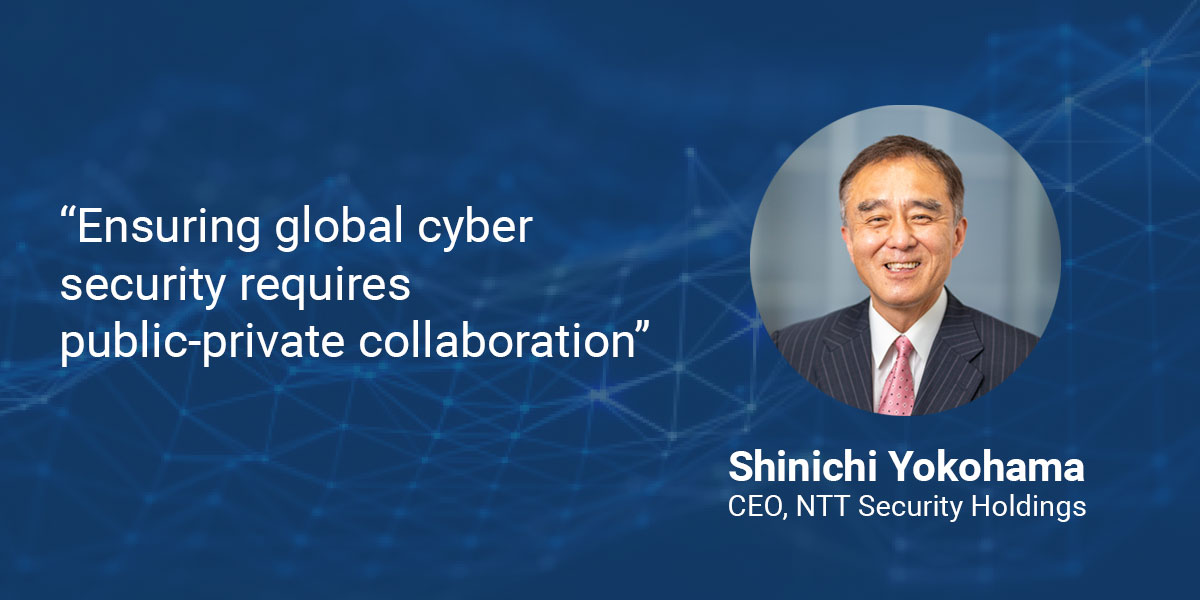
Digital optimism despite increased cyber threats and cross-border collaboration were two of the main themes of the Aspen Digital Global Cyber Security Group workshop in Madrid, Spain, in which NTT Security Holding’s CEO Shinichi Yokohama participated. The event was organized by Aspen Digital and aims to address significant technology and security challenges, and explore solutions for international cybersecurity collaboration across the public and private sectors.
The workshop brought together representatives from various backgrounds, sectors and nationalities to foster a rich dialogue about pressing matters. We had the opportunity to catch up with Shinichi to discuss the key takeaways from the workshop and his perspective on global cyber security collaboration.
Shinichi, what was the overall atmosphere at the Aspen Digital Global Cyber Security Group workshop?
The atmosphere was quite optimistic despite the challenging nature of our discussions. One of the main things I observed was the underlying optimism from all sectors and nationalities about the future of a digital society. There was a shared belief among us delegates that while cyber threats are a byproduct of digitalization, the benefits of digital progress outweigh the risks.
Despite the growing threat landscape, we shared a belief that collaboration, between sectors and nations, is paramount for the protection of critical infrastructure under the current "new norm". This "new norm" refers to the increasingly complex and persistent cyber threat environment that Chief Information Security Officers (CISOs) in the private and public sector must navigate.
How is the balance of responsibility between the public and private sectors progressing in terms of cyber security?
The balance is shifting. Historically, national security was primarily the government's responsibility. However, in the realm of cyber security, the private sector plays an equally crucial role. I once made an analysis which showed that in Japan, over 90 percent of IT and data assets are owned and handled by private companies. This is likely true for many other countries as well. Therefore, ensuring national cyber security cannot be achieved by the government alone. Private companies, the government, including public sector operations, and citizens must all be proactive in their cyber security measures. This collaboration between the public and private sectors is vital.
Can you elaborate on the different roles that the government and private sector play in cyber security?
There are specific functions that only governments can perform, such as law enforcement and international cooperation in arresting cyber criminals. Governments can also lead proactive cyber defense measures, where private companies are limited, which are essential for preventing attacks before they happen. The private sector not only owns and operates most of the infrastructure that needs protection, but it also possesses the most advanced competence and technology within cyber security. They are expected to implement robust cyber security practices and share threat intelligence with the government to create a broad cyber defense strategy.
Are there any examples of successful collaborations between public and private in cyber security?
Ukraine is a noteworthy example. Before the full-scale Russian invasion in February 2022, there was significant collaboration between the Ukrainian government and critical infrastructure companies, such as those in the transport, telecommunications, and power sectors. This proactive defense strategy has helped to mitigate the impact of cyber attacks during the war. This is an excellent example of the importance of collaboration between the public and private sectors.
What gives you optimism that we will manage the huge cyber challenges we face?
History shows that humanity is capable of minimizing damage while maximizing the benefits of new technologies. Whether it was the start of automobiles or electricity, we have always found ways to use technology for good while mitigating its risks. I believe the same will happen with digital technologies. Our discussions at the Aspen Digital Global Cyber Security Group reaffirmed my belief in the power of human cleverness and collaboration to overcome these challenges.
The next meeting of the Aspen Digital Global Cyber Security Group is set for the fall. This upcoming event promises to build on the progress made in Madrid and continue the important yet encouraging discussions around global cyber security collaboration. To learn more about the Aspen Institute and Aspen Digital, please visit their website.